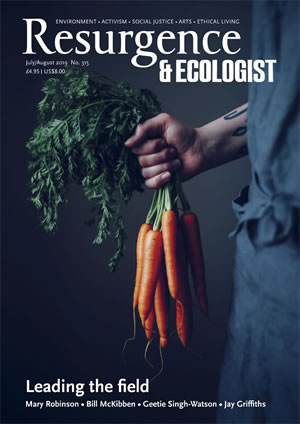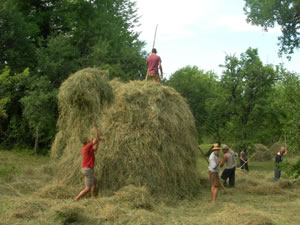Alunişu is a small Romanian/Hungarian village nestled in the foothills of the Apuseni Mountains in Transylvania, in a small oasis of fruit and walnut trees surrounded by fabulous forests and productive agricultural land. In the mountains bordering the village to the west, bears, wolves and lynxes still roam in a vast stretch of Nature reserve. In the rolling hills on the eastern side, local smallholders have been cultivating the fields for centuries. It was here that Robyn and Lars Veraart established their centre, Provision, in 2012.
Still today whole families are seen working together to collect hay and carry on the various elements of subsistence farming. This makes Alunişu an excellent place for visitors to Provision to see and experience the traditional life of Transylvania as well as to enjoy the splendour of its natural setting.
Lars is a Dutch vet who is interested in holistic and natural approaches. He has carried out ethno-veterinary research with peasant farmers in the Carpathians to find out how they treated their animals before the advent of modern pharmacy and pharmaceutical drugs. In doing so, he saw and was taken by the richness and beauty that he found in the small family farms. The contrast with the large industrial farms of the west, in which he was working professionally, was enormous. He explained, “We were very impressed with the infrastructure of these farms in Romania; on every smallholding, with a surface averaging one-fifth of a hectare, one finds space for a house with attic and root cellar, barn and outbuildings, orchard and kitchen garden. They all have outhouses and a well. The common lands are often still managed by the villagers. We were also attracted by the natural beauty, the abundance of clean air and water, the living soil and the biodiversity. We wanted to nestle ourselves into a still-vibrant peasant community, to learn and absorb their rich knowledge and be amidst their village community. Transylvania remains a place in Europe where this is still happening. We wanted to ‘catch’ the knowledge of the peasantry and try practising it.
“After a few years of learning from our neighbours, we realised that this knowledge is so precious that we wanted to share it with other eager searchers, as we knew there were many. We also wanted to help the local villagers to be more aware of the truth that what they are doing is valuable. So we created Provision, a small, unofficial school for self-sufficient living. This way, the flame of peasant knowledge and wisdom might spread and contribute to future food systems.
“Robyn knew that one line of her ancestors came from this region and thus she feels that here she is reconnecting with her old roots, which are a source of deep knowledge, inspiration and power.”
Robyn studied music and psychology at the Naropa Institute in Colorado, USA, and afterwards worked as a counsellor in a large women’s prison, where she provided space for yoga and meditation for many of the prisoners. She has been inspired by many different people and systems, both through her studies and through her work. Together, during a sabbatical she and Lars took from their jobs, they went on a pilgrimage to look at different ecovillages and intentional communities around the world. This journey was a huge inspiration to them, as during this time they experienced different ways of living and examined their own needs, as well as the ways of interbeing.
“We were reading works by John Seymour and Helen and Scott Nearing,” said Robyn. “We were doing meditations in the tradition of Thich Nhat Hanh and Pema Chödrön. We were reading Helena Norberg-Hodge and Andrew Harvey. And then we came to La Borie Noble, the original Arche community in the south of France, founded by Lanza del Vasto, a student of Mahatma Gandhi. This was the place that inspired us the most. There we found what we were looking for in terms of a place that had the music and dance we love, the spirituality we were yearning for, the voluntary simplicity and food production that felt good.”
“Living close to the land creates the possibility for us to reconnect with the basic elements of life – soil, water, air and fire – as well as to contribute directly towards our basic needs like food, clothing and shelter,” explained Lars. “By growing our own food and approaching life on our farm as a circular economy, we implicate ourselves in the web of life. Over time, we become ever more intimately aware of our connection with this web. We see more and more clearly the relations between our actions and their impact on our environment. When we are connected with the soil, water, air, fire and food, we are directly connected to the inner self and to the communities surrounding us. To us, these are all inseparable. Our lifestyle is a practice of integrity: to continue along the path of aligning our thoughts with our speech and with our actions. To grow our own organic food with care for the soil is important to us. We do everything in our power to take care of all aspects of our being and interbeing. This is our spiritual practice. At Provision we put our focus on food. For us, the way food is currently produced for the global community is one of humanity’s biggest common challenges. We see the action of growing our own food as ‘Gandhi’s spinning wheel’ of our times.”
Provision is a place to reconnect with Nature, soil, food, the inner self and community. The teachings are focused around agro-ecology, nonviolence and the creative arts. The purpose is to inspire visitors so they may carry forth the teachings into their own lives and work, to increase the wellness of people and the planet.
Robyn added, “We welcome students, participants, teachers, visitors and volunteers who are searching for this reconnection, wanting to share their wisdom and skills and searching to be inspired by a living example of a nonviolent peasant smallholding. We are organising courses, workshops, classes, meetings, gatherings and celebrations of all sorts. We are hosting volunteers from April through to October. We have limited space available, so we choose to focus on those who are willing to work on the integration of the inner with the outer.”
It is this living example of the art of living well in harmony with the land and creating inner harmony in doing so that I find so inspiring.
For more information: www.provisiontransylvania.com







